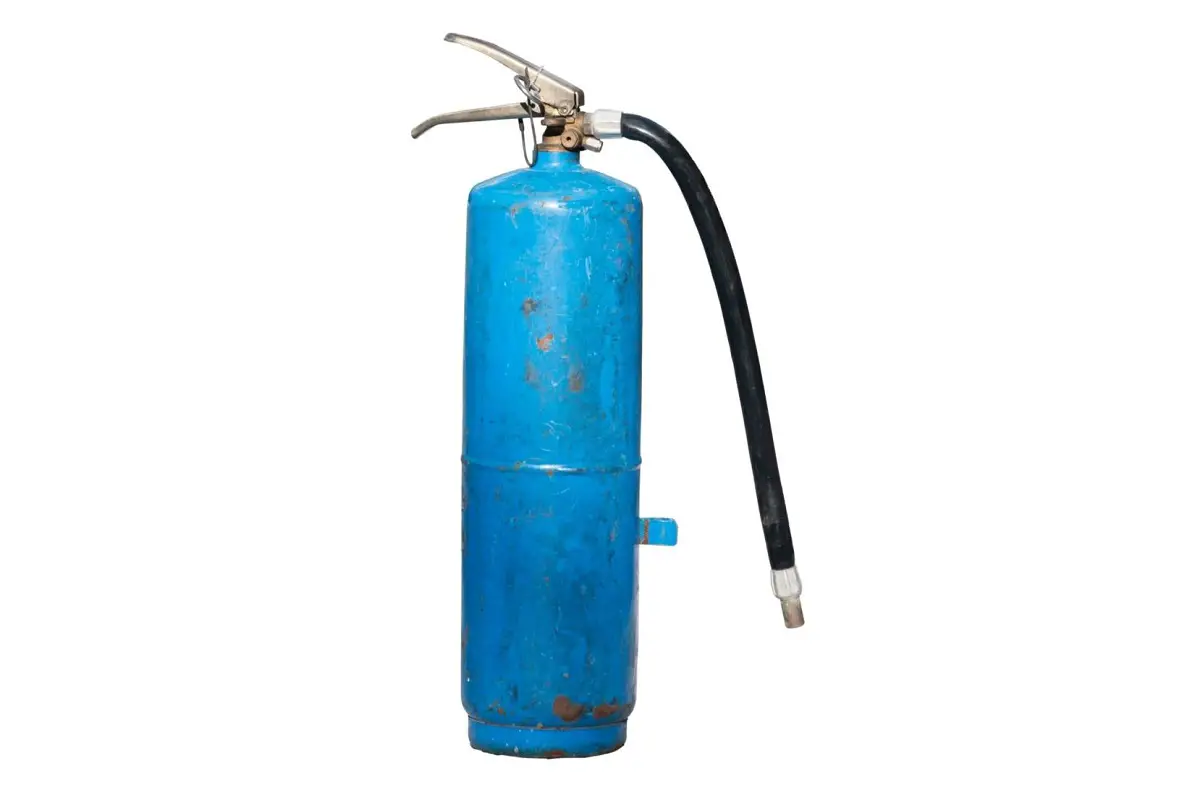Fire extinguishers can end up spent after multiple uses and recharges, or were only intended for one-time use and are no longer functional. If you can’t use a fire extinguisher anymore, is it possible to recycle it instead of throwing it in the trash?
Can You Recycle a Fire Extinguisher?
Yes, you can recycle a fire extinguisher. Fire extinguishers are made of very recyclable materials, including steel and aluminum.
The remaining chemicals inside a used fire extinguisher are normally chemically inert and non-toxic. The MSDS data sheet for that particular extinguisher will tell what these chemicals are. Some fire extinguishers may have toxic chemicals in them, so it is important to have these recycled in the proper place.

Non-toxic fire extinguisher chemicals include:
- Water
- Mono ammonium sulfate
- Sodium bicarbonate
- Potassium bicarbonate
The biggest issue with recycling old fire extinguishers is safety. These potential dangers include:
- Explosions occurring from pressurized contents.
- Old fire extinguisher may contain carcinogens, such as carbon terachloride.
- How and where to dipose of old contents prior to recycling the metal container.
This is why it is important to know where and how to recycle a used fire extinguisher, so as to not risk anyone’s safety.
Highly Rated Fire Extinguishers
Amerex B402, 5lb ABC Dry Chemical Class A B C Fire Extinguisher, with Wall Bracket
Kidde 21005779 Pro 210 Fire Extinguisher, ABC, 160CI, 4 lbs
When To Recycle a Fire Extinguisher
It is time to recycle a fire extinguisher if it can’t be recharged and has run out of sprayable pressure and contents.
But first, you must be sure the gauge that says the pressure is low is not faulty, when in fact there is pressure left in the cylinder. To do this, you can test the fire extinguisher in a plastic garbage bag by pressing on the handle and spraying it. If it seems there is enough pressure and contents left, then the pressure guage is not working properly.
A local household hazardous waste program (HHW) may accept pressurized metal containers, such as old fire extinguishers. These programs have collection events a few times per year at certain locations in your city. Other toxic or pressure filled products can also be recycled, such as old batteries, aerosol cans, and petroleum products.
Where To Recycle a Fire Extinguisher?
You can recycle a used fire extinguisher by taking it to your local fire department, or dropping it off at your local hazardous waste disposal facility. Some ordinary waste disposal facilities may also take recyclable materials, so check with these as well. The fire department may not be able to take old fire extinguishers so you will need to check with them first.
Some recycling facilities will only take scrap recyclable metal, which means the fire extinguisher needs to be drained of all its remaining contents prior to dropping it off.
A fire extinguisher and supply company in the area may also take used fire extinguishers and recycle them for you. Those same operations could refill the extinguisher for you as well, for a fee.
IMPORTANT: Do not place an old fire extinguisher in an ordinary curbside recycling bin with your other trash cans. Pressurized fire extinguishers are dangerous and there is the risk of explosion.
How To Recycle a Fire Extinguisher?
Recycling a fire extinguisher is not difficult, and only requires taking a few easy steps.
Before you recycle the extinguisher, check with the recycling agency or center about emptying any remaining contents. If you don’t need to empty and disassemble it, then you can avoid the steps below.
If you need to empty and disassemble the fire extinguisher, follow this process before recycling it:
- Check the gauge — it should read empty / zero pressure.
- Make sure the gauge works. Point the extinguisher into a large plastic trash bag, pull the pin, and pull the trigger. If it sprays a lot, then the gauge is faulty. If a little bit comes out empty the extinguisher into the bag if you can.
- Once the fire extinguisher is empty, start disassembling it. You will need a couple big wrenches, screwdriver(s) and maybe a rubber mallet.
- Let off the release valve / screw to ensure there is no pressure left in the cylinder.
- Unscrew the entire trigger / spray mechanism from the tank.
- Pull the mechanism out of the tank.
- Empty the tank upside down in your plastic bag, making sure there are no left over chemicals.
- Disassemble the trigger, handle, draw tube, gauge and hose.
- Take the aluminum or steel tank, along with any aluminum, brass or steel parts to a recycling center.
- Throw the remaining parts like the hose, plastic gauge, tags, etc. into a trash bin.
If you are unsure if you can do this safely, contact your local fire department or fire supply company and ask them how to do it (or just bring it to them intact).
How Much Does Recycling a Fire Extinguisher Cost?
Recycling a used fire extinguisher may cost you $0 or it could cost up to $20, depending on what location you take it to. There may be a minimum charge required, which is usually $10-15 for certain materials.
You may be able to toss the empty tank into your regular recycling bin, but should be a last resort. Try and take it to a proper recycling center first. If the fire extinguisher is a large commercial fire extinguisher that uses toxic chemicals, it will likely cost money to recycle.
In Closing
Like all useful tools, fire extinguishers eventually are spent and wear out, requireing them to be disposed of, recharged, or recycled. However, where and how to recycle them is a minor issue compared to having a fully operational fire extinguisher ready for the next fire emergency.
